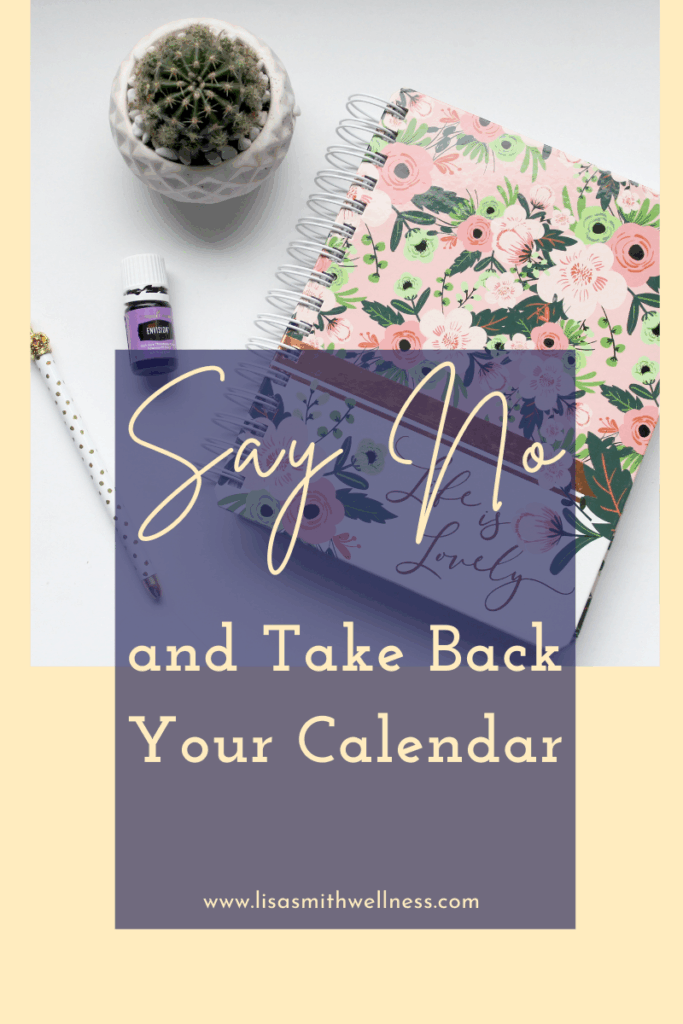Why should you start saying no?
Let’s be honest: most of us are walking around with calendars that look like a toddler was left alone with a sticker book. Overcommitted, overextended, and still somehow feeling like we’re not doing enough.
Sound familiar?
That’s where today’s conversation comes in—about the surprisingly radical idea that if you want more peace, energy, and fulfillment, you’ve got to stop giving your time to things you don’t even want.
Yep, we’re going there…this post involves boundaries, priorities, and the tiny-but-mighty word “no.”
Let’s sharpen the metaphorical saw, shall we?
This post contains affiliate links meaning I make a small commission at no extra cost to you. Thank you for supporting the work of Lisa Smith Wellness and the Pretty Well Podcast!

Step One: Sharpen the Saw (Before You Slice Off Your Sanity) and Practice Saying No
Stephen Covey’s classic The 7 Habits of Highly Effective People is basically the OG life-coaching blueprint. One of my favorite takeaways? Habit #7: Sharpen the Saw.
Translation: you are your greatest asset—and if you’re running yourself ragged with a dull blade (aka zero margin, no rest, all go-no-stop), you’re not doing yourself or anyone else any favors.
And yes, this metaphor is very real. Have you ever tried to chop a sweet potato with a dull knife? You basically end up wrestling it like it insulted your mother. And honestly, you’re more likely to injure yourself with that dull knife than a sharp one. The same goes for your nervous system.
Sharpening your saw = taking care of yourself so you can actually do the things you care about without resenting everyone involved.
Step Two: Saying No Like You Mean It
No is a complete sentence. And yet somehow, many of us (me included) feel the need to follow it with a dissertation, a guilt sandwich, and an offer to do something even less appealing at a later date.
But here’s the truth: every time you say “yes” to something that drains you, you’re saying “no” to the things that matter. Your energy is finite. Your time is finite. Your brainpower is very finite.
Start small. If someone invites you to an event that makes your eye twitch just thinking about it, try this:
- “That doesn’t work for me, but thank you.”
- “I’m going to pass this time.”
- “I appreciate the invite—I’m keeping things low-key right now.”
Notice I didn’t say you need an excuse. Needing rest is a reason. Wanting margin is a reason. Having no desire to listen to a distant cousin’s MLM pitch while eating Costco cheese cubes? Totally valid.
Your “no” protects your “yes.” Read that again.
Step Three: Break Up with Multitasking
We’ve glamorized multitasking for years. But get this: science says it’s a lie.
You’re not multitasking—you’re just switching focus really fast and doing a mediocre job at both things. You’re basically a human pop-up window.
Whether it’s replying to emails during dinner, texting while watching your kids’ soccer game, or folding laundry while on a Zoom call, it all adds up to mental clutter.
Try mono-tasking. It’s revolutionary. One thing at a time. Full focus. Less burnout.

Step Four: Get Ruthless with Your Calendar
Here’s a tough-love question: is your calendar filled with things that actually get you closer to the life you want—or is it just a collection of obligations, shoulds, and default settings?
If your ideal life includes health, creativity, joy, connection, and calm—but your calendar includes three evening meetings a week, no exercise, and dinners that consist of eating hummus out of the container—there’s a mismatch.
Try this:
- Audit your week. What activities give you energy? What drain you?
- Delete or delegate what doesn’t align.
- Protect open space like your life depends on it. Because your quality of life kind of does.
Margin isn’t laziness—it’s mental health. It’s freedom. It’s where creativity, intuition, and unexpected joy live.
Step Five: Try the Ivy Lee Method (this definitely works)
This ancient productivity trick from the early 1900s is somehow more relevant than ever:
- At the end of each workday, write down the six most important things you need to do the next day.
- Rank them in order of importance.
- The next day, work on the first task until it’s finished, then move on to the next.
No bouncing around, opening your inbox mid-task, or multitasking yourself into a cortisol puddle.
If six sounds like a lot, start with three. That’s it. Just three things that matter. When you finish them, bonus round. Otherwise? Celebrate and go read a book, go for a walk, or call a friend.
Step Six: Download Your Brain
Your brain is not a filing cabinet—it’s a Post-it in a windstorm.
That’s why every time you think “Oh, I have to remember to call the dentist,” it ping-pongs around your brain until it hijacks your focus during something completely unrelated (like writing a blog post… hypothetically).
Try this: brain dump all the mental clutter into a note, notebook, or app. Get it out of your head and onto something reliable. You’ll immediately feel more grounded, focused, and less like a browser with 47 tabs open.
Bonus: if you use your phone’s reminders app, you can stop waking up at 2am remembering that one thing you forgot to do two weeks ago.
Pin this for Later

TL;DR — Cliff Notes for the Chronically Overcommitted
Getting what you actually want out of life isn’t about hustling harder. It’s about clearing space for the things that matter.
So if you’re tired of feeling overbooked, under-rested, and a little bit salty about the pace of your life—it might be time to start:
- Saying no more often
- Sharpening your metaphorical saw
- Mono-tasking like a minimalist
- Protecting your calendar like it’s Fort Knox
- Doing less, better
- Writing it down, letting it go
And most importantly: giving up what you don’t want… to make space for what you really do.
Because the life you want? It doesn’t start with another to-do list. It starts with a few well-placed “no’s.”
+ view comments . . .